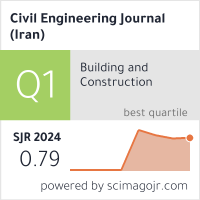Multi-Cycle Production Development Planning for Sustainable Power Systems to Maximize the Use of Renewable Energy Sources
Downloads
Doi:10.28991/CEJ-2022-08-11-018
Full Text:PDF
Downloads
[2] Chel, A., & Kaushik, G. (2018). Renewable energy technologies for sustainable development of energy efficient building. Alexandria Engineering Journal, 57(2), 655–669. doi:10.1016/j.aej.2017.02.027.
[3] Li, Q., Wang, J., Zhang, Y., Fan, Y., Bao, G., & Wang, X. (2020). Multi-period generation expansion planning for sustainable power systems to maximize the utilization of renewable energy sources. Sustainability (Switzerland), 12(3), 1083. doi:10.3390/su12031083.
[4] Lu, Y., Khan, Z. A., Alvarez-Alvarado, M. S., Zhang, Y., Huang, Z., & Imran, M. (2020). A critical review of sustainable energy policies for the promotion of renewable energy sources. Sustainability (Switzerland), 12(12), 5078. doi:10.3390/su12125078.
[5] Anvari-Moghaddam, A., Mohammadi-ivatloo, B., Asadi, S., Guldstrand Larsen, K., & Shahidehpour, M. (2019). Sustainable Energy Systems Planning, Integration, and Management. Applied Sciences, 9(20), 4451. doi:10.3390/app9204451.
[6] Ndayishimiye, V., Zhang, X., Nibagwire, D., Simiyu, P., Dushimimana, G., & Bikorimana, S. (2019). Environmental benefits of modern power system and clean energy. E3S Web of Conferences, 107, 2006. doi:10.1051/e3sconf/201910702006.
[7] Fan, D., Dou, X., Xu, Y., Wu, C., Xue, G., & Shao, Y. (2021). A Dynamic Multi-Stage Planning Method for Integrated Energy Systems considering Development Stages. Frontiers in Energy Research, 9, 723702. doi:10.3389/fenrg.2021.723702.
[8] Unsihuay-Vila, C., Marangon-Lima, J. W., Zambroni De Souza, A. C., & Perez-Arriaga, I. J. (2011). Multistage expansion planning of generation and interconnections with sustainable energy development criteria: A multiobjective model. International Journal of Electrical Power and Energy Systems, 33(2), 258–270. doi:10.1016/j.ijepes.2010.08.021.
[9] Abdullah, L., Chan, W., & Afshari, A. (2019). Application of PROMETHEE method for green supplier selection: a comparative result based on preference functions. Journal of Industrial Engineering International, 15(2), 271–285. doi:10.1007/s40092-018-0289-z.
[10] Rigo, P. D., Rediske, G., Rosa, C. B., Gastaldo, N. G., Michels, L., Júnior, A. L. N., & Siluk, J. C. M. (2020). Renewable energy problems: Exploring the methods to support the decision-making process. Sustainability (Switzerland), 12(23), 1–27. doi:10.3390/su122310195.
[11] Rigo, P. D., Rediske, G., Rosa, C. B., Gastaldo, N. G., Michels, L., Neuenfeldt Júnior, A. L., & Siluk, J. C. M. (2020). Renewable Energy Problems: Exploring the Methods to Support the Decision-Making Process. Sustainability, 12(23), 10195. doi:10.3390/su122310195.
[12] Dudovskiy, J. (2016). The ultimate guide to writing a dissertation in business studies: A step-by-step assistance. Goodreads, Pittsburgh, Pennsylvania, United States.
[13] Goldkuhl, G. (2012). Pragmatism vs interpretivism in qualitative information systems research. European Journal of Information Systems, 21(2), 135–146. doi:10.1057/ejis.2011.54.
[14] Maxwell, J.A. (2012). Qualitative research design: An interactive approach. Sage Publications, Thousand Oaks, California, United States.
[15] Saunders, M., Lewis, P., & Thornhill, A. (2009). Research methods for business students. Pearson Education, London, United Kingdom.
[16] Danermark, B. (2002). Interdisciplinary Research and Critical Realism the Example of Disability Research. Alethia, 5(1), 56–64. doi:10.1558/aleth.v5i1.56.
[17] Debout, C. (2016). Qualitative case study. Soins, 61(806), 57–60. doi:10.1016/j.soin.2016.04.018.
[18] Rashid, Y., Rashid, A., Warraich, M. A., Sabir, S. S., & Waseem, A. (2019). Case Study Method: A Step-by-Step Guide for Business Researchers. International Journal of Qualitative Methods, 18. doi:10.1177/1609406919862424.
[19] Daas, P., & Arends-Tóth, J. (2012). Secondary data collection. Statistics Netherlands. The Hague, Bassendean, Australia.
[20] Cheng, H. G., & Phillips, M. R. (2014). Secondary analysis of existing data: opportunities and implementation. Shanghai Archives of Psychiatry, 26(6), 371–375. doi:10.11919/j.issn.1002-0829.214171.
[21] Hox, J.J., & Boeije, H.R. (2005). Data collection, primary versus secondary. In: Kempf-Leonard, K. (eds.) Encyclopedia of Social Measurement, 593–599, Elsevier, Amsterdam, Netherlands.
[22] Braun, V., & Clarke, V. (2012). Thematic analysis. APA handbook of research methods in psychology, Vol. 2. Research designs: Quantitative, qualitative, neuropsychological, and biological, 57–71, American Psychological Association, Washington, United States. doi:10.1037/13620-004.
[23] Tripathy, J. P. (2013). Secondary data analysis: Ethical issues and challenges. Iranian Journal of Public Health, 42(12), 1478–1479.
[24] Biel, K., & Glock, C. H. (2016). Systematic literature review of decision support models for energy-efficient production planning. Computers and Industrial Engineering, 101, 243–259. doi:10.1016/j.cie.2016.08.021.
[25] Gahm, C., Denz, F., Dirr, M., & Tuma, A. (2016). Energy-efficient scheduling in manufacturing companies: A review and research framework. European Journal of Operational Research, 248(3), 744–757. doi:10.1016/j.ejor.2015.07.017.
[26] Gao, K., Huang, Y., Sadollah, A., & Wang, L. (2020). A review of energy-efficient scheduling in intelligent production systems. Complex & Intelligent Systems, 6(2), 237–249. doi:10.1007/s40747-019-00122-6.
[27] Zhou, S., Jin, M., & Du, N. (2020). Energy-efficient scheduling of a single batch processing machine with dynamic job arrival times. Energy, 209, 118420. doi:10.1016/j.energy.2020.118420.
[28] Sadeghi, H., Rashidinejad, M., & Abdollahi, A. (2017). A comprehensive sequential review study through the generation expansion planning. Renewable and Sustainable Energy Reviews, 67, 1369–1394. doi:10.1016/j.rser.2016.09.046.
[29] Koltsaklis, N. E., & Dagoumas, A. S. (2018). State-of-the-art generation expansion planning: A review. Applied Energy, 230, 563–589. doi:10.1016/j.apenergy.2018.08.087.
[30] Conejo, A.J., Baringo, L., Kazempour, S.J., & Siddiqui, A.S. (2016). Investment in electricity generation and transmission. Springer International Publishing, Cham, Switzerland. doi:10.1007/978-3-319-29501-5.
[31] Alizadeh, B., & Jadid, S. (2015). A dynamic model for coordination of generation and transmission expansion planning in power systems. International Journal of Electrical Power & Energy Systems, 65, 408–418. doi:10.1016/j.ijepes.2014.10.007.
[32] Munoz, F. D., & Watson, J. P. (2015). A scalable solution framework for stochastic transmission and generation planning problems. Computational Management Science, 12(4), 491–518. doi:10.1007/s10287-015-0229-y.
[33] He, Y., Wan, L., Zhang, M., & Zhao, H. (2022). Regional Renewable Energy Installation Optimization Strategies with Renewable Portfolio Standards in China. Sustainability (Switzerland), 14(17), 10498. doi:10.3390/su141710498.
[34] Teng, F., Zhang, Q., Wang, G., Liu, J., & Li, H. (2021). A comprehensive review of energy blockchain: Application scenarios and development trends. International Journal of Energy Research, 45(12), 17515–17531. doi:10.1002/er.7109.
[35] Wei, Y., Ye, Q., Ding, Y., Ai, B., Tan, Q., & Song, W. (2021). Optimization model of a thermal-solar-wind power planning considering economic and social benefits. Energy, 222, 119752. doi:10.1016/j.energy.2021.119752.
[36] Claus, T., Herrmann, F., & Manitz, M. (2015). Production planning and control: research approaches, methods and their applications. Springer, Berlin, Germany. doi:10.1007/978-3-662-43542-7. (In German).
[37] Trost, M., Claus, T., Teich, E., Selmair, M., & Herrmann, F. (2016). Social and Ecological Capabilities for a Sustainable Hierarchical Production Planning. ECMS 2016 Proceedings Edited by Thorsten Claus, Frank Herrmann, Michael Manitz, Oliver Rose. doi:10.7148/2016-0432.
[38] Dai, C., Tang, M., Liu, Y., He, J., Yang, Z., & Yang, Y. (2020). Designing Smart Energy Network Ecosystem for Integrated energy services in urban areas. 2020 IEEE 16th International Conference on Automation Science and Engineering (CASE). doi:10.1109/case48305.2020.9216903.
[39] He, X., & Zheng, L. (2019). Analysis of Multi-energy Complementary Integration Optimization Technology. E3S Web of Conferences, 118, 1057. doi:10.1051/e3sconf/201911801057.
[40] Wang, S., Feng, L., Zhang, P., & Wu, L. (2014). The Hybrid of Multiple Energy Promotes New Energy Development. Northwest Hydropower, 6, 78-82.
[41] Hou, R., Li, S., Chen, H., Ren, G., Gao, W., & Liu, L. (2021). Coupling mechanism and development prospect of innovative ecosystem of clean energy in smart agriculture based on blockchain. Journal of Cleaner Production, 319, 128466. doi:10.1016/j.jclepro.2021.128466.
[42] Yan, R., Chen, Y., & Zhu, X. (2022). Optimization of Operating Hydrogen Storage System for Coal–Wind–Solar Power Generation. Energies, 15(14), 501. doi:10.3390/en15145015.
- Authors retain all copyrights. It is noticeable that authors will not be forced to sign any copyright transfer agreements.
- This work (including HTML and PDF Files) is licensed under a Creative Commons Attribution 4.0 International License.![]()















